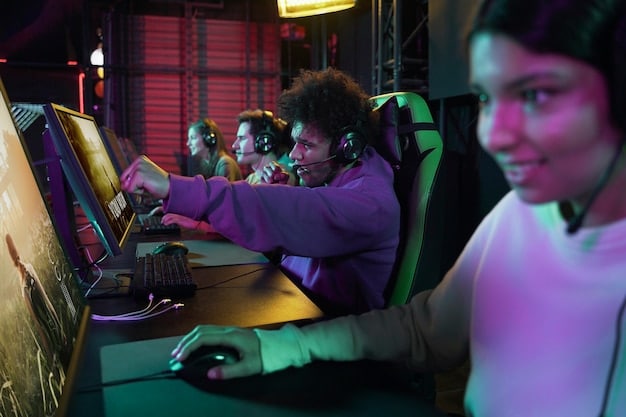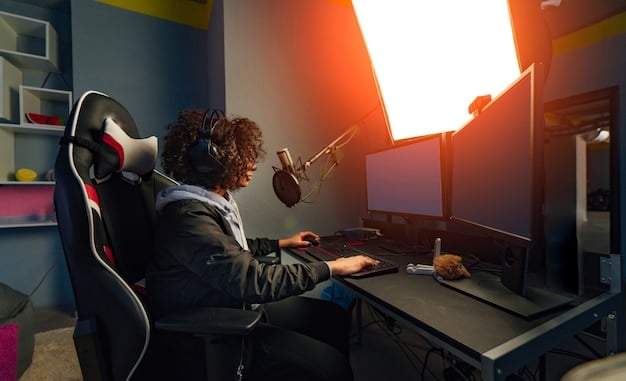US Esports Tournaments: Find & Register for Beginners

Navigating the landscape of US esports tournaments for beginners involves identifying reliable platforms, understanding game-specific ecosystems, adhering to registration guidelines, and effectively preparing for competitive play to maximize participation and growth.
For aspiring competitive gamers in the United States, the journey of understanding how to find and register for US esports tournaments: a comprehensive guide for beginners can seem like a labyrinth. This guide aims to demystify the process, providing a clear pathway from initial curiosity to active participation in the dynamic world of esports. Whether you dream of casual competition or reaching professional circuits, having a structured approach is paramount to your success and enjoyment in this rapidly expanding industry.
Understanding the Esports Landscape in the US
The US esports scene is a vibrant, diverse ecosystem, constantly evolving with new games, platforms, and opportunities. Beginners often find themselves wondering how to even begin exploring this expansive world. It’s not just about major leagues; a significant portion of the competitive landscape is built upon grassroots events, online qualifiers, and community-driven tournaments that cater specifically to emerging talent.
To truly grasp the scale, consider the sheer number of active players and the variety of titles. From mainstream hits like “League of Legends” and “Valorant” to fighting games such as “Street Fighter” and sports simulations like “FIFA,” each game cultivates its own unique competitive circuit. Understanding this segmentation is the first step towards identifying where you fit in.
Key Characteristics of US Esports
- Decentralization: Unlike traditional sports, esports is rarely governed by a single, overarching body. Instead, it’s a tapestry woven from game publishers, independent organizers, and third-party platforms.
- Accessibility: Many tournaments, especially online ones, have low barriers to entry, making them ideal for beginners looking to gain experience.
- Player-Driven Communities: A significant portion of tournament organization and promotion happens within dedicated player communities on platforms like Discord, Reddit, and Twitch.
Furthermore, the physical presence of esports in the US cannot be understated. Major cities frequently host conventions, LAN events, and championship series, offering opportunities for in-person competition and networking. Even if your initial focus is online play, recognizing these offline hubs can be beneficial for future progression. This foundational understanding is crucial before delving into the specifics of finding and registering for events.
Identifying Your Game and Skill Level
Before embarking on the quest for tournaments, it’s essential to define which game you want to compete in and to realistically assess your current skill level. Many beginners make the mistake of jumping into competitive play for a game they are only moderately familiar with, leading to frustration. Specializing in one or two titles is often more productive.
Consider dedicating time to exploring different genres. Do you prefer the strategic depth of a real-time strategy game, the fast-paced action of a first-person shooter, or the intricate mechanics of a fighting game? Once you’ve chosen your competitive title, immerse yourself in its community. This is where you’ll find discussions about optimal strategies, upcoming patches, and, critically, information on competitive play.
Assessing Your Skill
A truthful self-assessment of your skill level is vital for a rewarding tournament experience. Are you still learning the basic mechanics, or do you consistently rank highly in public matchmaking? Start by participating in casual online matches, climbing ranked ladders, and engaging with more seasoned players. This organic progression will not only improve your gameplay but also give you a clearer picture of your competitive readiness.
Many online platforms offer internal ranking systems that can provide a good benchmark. Don’t be discouraged if you’re not at the top; the goal is to find tournaments that match your current ability, allowing for growth and learning rather than an overwhelming defeat. Participating in smaller, local tournaments or online community events can serve as perfect stepping stones before considering larger, more competitive circuits.
Where to Find US Esports Tournaments

Once you’ve identified your game and have a sense of your skill level, the next crucial step is locating the actual tournaments. The landscape for finding these events is diverse, spanning dedicated esports platforms to community forums and social media. Relying on multiple sources is often the best strategy to ensure you don’t miss out on opportunities, especially for smaller, community-driven events.
Online Tournament Platforms
Several major online platforms serve as central hubs for esports tournaments in the US, catering to various games and skill levels. These platforms generally provide comprehensive listings, direct registration, and often manage the tournament bracket and reporting of results. Familiarizing yourself with their interfaces and features is highly recommended.
- Challonge: A popular platform for organizing and finding open-bracket tournaments, often used by smaller organizations and community groups.
- Toornament: Offers a wide range of tournament types and is used by independent organizers and larger event groups alike.
- Smash.gg (now Start.gg): Primarily focused on fighting games but expanding to other genres, known for its robust registration and event management tools.
- Faceit / ESEA: More specific to first-person shooters like CS:GO, offering leagues and competitive matchmaking alongside traditional tournaments.
Beyond these, game-specific platforms or launchers often have their own integrated tournament systems. For instance, some game publishers host official in-game tournaments or have dedicated sections on their websites detailing competitive events. Always check the official game website or launcher for direct connections to official circuits.
Social Media & Community Channels
Word-of-mouth and community engagement play a significant role in tournament discovery, particularly for grassroots events. Following specific game communities on platforms like Discord, Reddit, and Twitter can unlock a treasure trove of information.
- Discord Servers: Join official and community-run Discord servers for your chosen game. Many tournament organizers use these servers to announce events, facilitate team finding, and answer questions.
- Reddit Subreddits: Game-specific subreddits often feature dedicated weekly or daily threads for tournament announcements and discussions.
- Twitter: Follow professional players, esports organizations, and major tournament organizers. Many events are initially announced here.
- Twitch: Streamers often host community tournaments or promote events their viewers can join. Watch streams of your chosen game to stay updated.
Networking within these communities can also lead to direct invitations or knowledge about less-publicized events. Don’t underestimate the power of simply asking around; the esports community is generally welcoming and eager to help new players find their footing.
Registration Process and Requirements
Once you’ve found a tournament that piques your interest, the next hurdle is the registration process. While specific requirements can vary, there are common elements every beginner should be aware of. Meticulous attention to detail during registration can prevent last-minute issues and ensure a smooth entry into the competition.
General Registration Steps
Most online tournaments follow a similar registration flow, often facilitated by the platforms mentioned earlier (e.g., Challonge, Start.gg). Typically, you’ll need to:
- Create an Account: If you don’t already have one, create an account on the tournament platform. This usually involves linking your game accounts (e.g., Steam, Riot ID, PlayStation Network).
- Navigate to the Tournament Page: Find the specific tournament you wish to enter. Most platforms have a search function or dedicated event listings.
- Review Rules and Requirements: Before registering, thoroughly read the tournament rules, eligibility criteria (age, region), prize pool details, and schedule. Pay close attention to hardware requirements (e.g., PC specs, specific controllers), permissible in-game settings, and rules of conduct.
- Complete Registration Form: Fill out all required fields, which may include your in-game name, team name (if applicable), contact email, and payment information (if there’s an entry fee).
- Confirm Entry: After submission, you might receive a confirmation email. Some tournaments require manual approval by organizers, while others are automatic.
For in-person tournaments, the process might involve purchasing tickets, agreeing to waivers, and potentially presenting ID on-site. Always check the official event website for specific instructions regarding physical attendance.
Common Eligibility Criteria and Fees
Tournaments often have specific criteria to ensure fair play and manage logistics. Being aware of these can save you time and potential disappointment:
- Age Restrictions: Many tournaments, especially those with prize money, have minimum age requirements (e.g., 13+, 16+, or 18+).
- Regional Eligibility: Tournaments might be restricted to specific regions, countries, or even states within the US to manage latency or ensure local competition.
- Game Account Details: Ensure your game account information is accurate and matches the details provided during registration. Inconsistencies can lead to disqualification.
- Entry Fees: While many online beginner-friendly tournaments are free, some may have small entry fees. These fees often contribute to prize pools or cover organizational costs. Always confirm the amount and accepted payment methods.
It’s also worth noting that some tournaments require you to join a specific Discord server for communication and updates. Missing these steps can result in being left out of crucial announcements or even being disqualified if you don’t check in on time virtually.
Preparing for Your First Tournament
Registering for a tournament is just the beginning. Effective preparation is key to a positive and successful experience, especially for beginners. This involves not only sharpening your gameplay but also understanding the logistical and mental aspects of competitive play.
Gameplay Practice and Strategy
Consistent and focused practice is paramount. Don’t just play casually; instead, identify areas for improvement. Review your own gameplay, analyze professional matches, and actively seek feedback from more experienced players. Consider:
- Targeted Practice: Focus on specific mechanics or strategies you struggle with. If your aim needs work, dedicate practice time solely to aim training. If your map awareness is weak, spend time analyzing maps.
- Scrimming: For team-based games, practice with your team against other organized teams. This helps build synergy, communication, and allows you to test strategies in a competitive environment.
- Strategy Refinement: Develop a clear understanding of the meta-game and formulate strategies for different scenarios. Have backup plans if your initial strategy fails.
Beyond individual skill, understanding tournament-specific rules, such as pick/ban phases, map rotations, or specific game versions (patches), is crucial. Practice under these conditions to avoid surprises during the actual event.

Logistics and Mental Preparation
Tournament day logistics can be just as important as gameplay. Ensure your setup is ready and optimized for competition.
- Hardware Check: Verify your peripherals (mouse, keyboard, headset, controller) are functioning correctly. Ensure your PC meets game requirements and drivers are updated.
- Internet Connection: A stable and fast internet connection is non-negotiable for online tournaments. Run speed tests and ensure no background processes are consuming bandwidth.
- Comfort and Ergonomics: A comfortable setup can prevent fatigue and improve focus during long sessions.
- Sleep and Nutrition: Prioritize good sleep before the tournament. Stay hydrated and have healthy snacks readily available.
- Mental Readiness: Esports can be mentally taxing. Practice staying calm under pressure, managing tilt, and focusing on the next round, not past mistakes. Develop a positive mindset and learn from every match, win or lose.
Having a pre-tournament routine—whether it’s warming up in-game, stretching, or meditating—can help you get into the right headspace. Remember, even professional players have routines to manage the pressure of competition.
Common Challenges and How to Overcome Them
Entering the competitive esports scene, especially as a beginner, comes with its own set of challenges. From dealing with unexpected technical issues to navigating intense competitive environments, being prepared for these hurdles can significantly improve your overall experience.
Technical Difficulties
Lag, disconnections, and hardware failures are common culprits that can derail a tournament run. While not all issues are preventable, many can be mitigated with proper preparation. Always ensure your internet connection is stable and that your gaming hardware and software are up-to-date and functioning optimally. For online tournaments, consider having a backup internet connection (like a phone hotspot for emergencies) if one is available. Communicate any issues promptly with tournament organizers as per their rules.
Dealing with Losses and Tilt
Losing is an inherent part of competitive play, and how you react to it can define your journey. “Tilt,” a state of frustration and poor decision-making often triggered by successive losses, is a significant challenge. Learning to manage emotions is crucial. Focus on learning from your mistakes rather than dwelling on them. Taking short breaks between matches, analyzing what went wrong, and maintaining good communication with teammates (if applicable) can help mitigate tilt. Remember that every loss is an opportunity for growth.
Furthermore, don’t compare yourself solely to top-tier players. Focus on your own progress and celebrate small victories. The path to improvement is gradual, and setbacks are a natural part of the process. Developing resilience and a growth mindset will serve you well in the competitive scene.
Advancing Your Esports Journey
After gaining initial tournament experience, you might find yourself eager to progress further in the esports world. This involves continually refining your skills, networking, and exploring more competitive opportunities. The journey from beginner to seasoned competitor is one of continuous learning and adaptation.
Continuous Improvement and Networking
To truly advance, passive play won’t suffice. Actively seek ways to improve. This includes:
- Match Analysis: Record and review your own gameplay and that of your opponents. Identify patterns, weaknesses, and opportunities for improvement.
- Coaching and VOD Reviews: Consider paid coaching or free VOD (Video on Demand) reviews from experienced players. Constructive feedback is invaluable.
- Theory Crafting: Stay updated on game patches, meta changes, and new strategies. Understand why certain picks or plays are strong.
Networking within the esports community can open doors. Build positive relationships with other players, teams, and even tournament organizers. A good reputation and strong connections can lead to invitations to private scrims, team openings, or early access to new competitive events. Participate actively in community discussions, offer help, and be a positive presence.
Exploring Higher-Tier Competitions
As your skill and experience grow, you’ll naturally look towards more challenging tournaments. These might include:
- Publisher-Sponsored Leagues: Many game publishers organize official leagues with significant prize pools and clear progression paths (e.g., amateur to pro tiers).
- Major LAN Events: Larger, in-person events often have qualifiers that lead to prestigious main events with substantial viewership and prizes.
- Collegiate Esports: If you’re a student, many universities offer esports programs, scholarships, and opportunities to compete against other institutions. This can be a structured pathway to competitive play.
Research the competitive ecosystem of your specific game. Understand the various tiers of competition and the pathways to climb them. Be realistic about the commitment required for higher-tier play, as it often demands dedicated practice time, travel, and a professional attitude. This ongoing dedication is what separates casual players from serious competitors.
| Key Point | Brief Description |
|---|---|
| 🎮 Choose Your Game | Select a game you enjoy and realistically assess your current skill level to find suitable tournaments. |
| 🔍 Find Tournaments | Utilize online platforms (e.g., Start.gg, Challonge) and community channels (Discord, Reddit) for listings. |
| ✅ Register Accurately | Follow platform-specific instructions, meet eligibility, and pay attention to deadlines and fees. |
| 💪 Prepare Thoroughly | Practice gameplay, check hardware, ensure strong internet, and mentally prepare for competition. |
Frequently Asked Questions About US Esports Tournaments
▼
E-E-A-T stands for Experience, Expertise, Authoritativeness, and Trustworthiness. In esports content, it means providing information from real-world experience (playing, competing), demonstrating deep knowledge of games and competitive scenes, being a recognized voice in the community, and ensuring all facts are accurate and reliable. This builds credibility for the reader.
▼
Yes, most US esports tournaments have age restrictions, commonly 13+, 16+, or 18+. These are often due to legal requirements regarding prize money, online agreements, or content ratings of the games. Always check the specific tournament’s rules and regulations regarding age eligibility before registering, as parental consent may be required for minors.
▼
It depends on the game and tournament format. Many games, like “Valorant” or “League of Legends,” are team-based and require a full squad. However, fighting games or some sports simulations are often solo competitions. Many platforms offer “free agent” sections or Discord channels where you can find teammates, or you can register for solo queues in team games.
▼
Entry fees vary widely. Many beginner-friendly online tournaments are free, especially those organized by communities. Larger tournaments or those with significant prize pools may have entry fees ranging from $5 to $50 or more per player. In-person LAN events often include a venue fee in addition to a tournament entry fee. Always check payment requirements during registration.
▼
First, communicate immediately with the tournament organizers through their designated communication channels (usually Discord or the tournament platform’s chat). Provide clear details of the issue. Have backups ready, such as a strong Wi-Fi signal or tethering to your phone if your main connection fails. Always read the tournament rules on how to report technical problems or request pauses.
Conclusion
Embarking on your journey into US esports tournaments as a beginner is an exciting endeavor, one that promises both challenges and immense rewards. By systematically approaching the process—from understanding the vast landscape to meticulously preparing for competition—you equip yourself not just for participation, but for genuine growth. The key lies in identifying your precise competitive interest, leveraging the right resources to discover opportunities, and diligently navigating the registration pathways. While obstacles such as technical glitches or competitive pressure are inevitable, a mindset focused on continuous learning, resilience, and community engagement will propel you forward. Ultimately, the world of esports is a vibrant community waiting to welcome dedicated players, and with this guide, you are well-prepared to take your first confident steps toward competitive gaming success.





